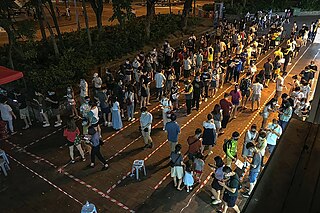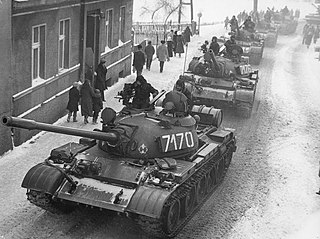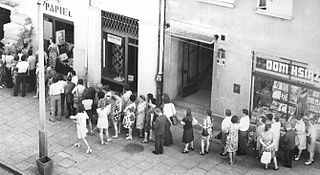
A line stander, queue stander, line sitter or queue professional is a person who takes a position in a queue in place of another, often for payment. This informal occupation came to an existence out of the necessity to stand long times in queues.

A line stander, queue stander, line sitter or queue professional is a person who takes a position in a queue in place of another, often for payment. This informal occupation came to an existence out of the necessity to stand long times in queues.
Line sitting is often a paid endeavor, with companies recruiting people, sometimes homeless people, to sit in lines for a price. [1] In some circumstances, people can make sufficient money to line sit professionally. [2]
In rare cases, people also choose to sit in line for non-monetary purposes, e.g. for media attention at major events, Greg Packer is an example of this. [3]
The practice of line sitting has drawn academic research. A study conducted by Georgetown University and Johns Hopkins University employs queueing theory and game theory to study the economic and operational dynamics of line sitting. [4] The researchers contrast line sitting with the commonly used pay-for-priority scheme and show why line sitting can be a win-win for the service provider and customers alike.
In Poland, this peculiar occupation (Polish : stacz kolejkowy) was reported as a neologism [5] during the early 1980s. By the end of the Communist regime there were severe shortages of consumer goods. [6] With the transition to a market economy, shortages gradually went away, but the business opportunities for linestanders remained.
A Polish professional line stander, Tadeusz Żak, has said that his profession requires certain personal traits: honesty, credibility, activity, persistence, and perseverance. He says he once stood in line for 40 hours. His specialization is lines in hospitals for registration to high-demand and rare specialists. [7] In 2013 Żak lost his 13-year-old business, because local hospitals introduced advance registration. [8] Fortunately, Polish newspapers made "pan Tadek" a celebrity, and he started receiving various offers, some unrelated to his "business", for example, a role of a marionette in opera Rigoletto (because he is a dwarf). In 2014 he even accepted an invitation from the Democratic Left Alliance to stand for the city council in his home city of Tarnov. [9]
Recently, line standers have started to take advantage of modern technology. In 2015, one of the winners of the Business Intelligence Hackathon API (BIHAPI) contest in Poland was a mobile app with a recognizable name "Stacz Kolejkowy" ("line stander"). [10] [11]
Another peculiarity of Polish shortage economy and the resulting long queues were "queue list" (lista kolejkowa) and "queue committee" (komitet kolejkowy). When the waiting time was long, conflicts often arose about the place in the queue. (The corresponding phrase "Pan tu nie stał!" ("You didn't stand here, sir!") has become an element of PRL nostalgia. [12] ) To mitigate these conflicts, a spontaneous "queue list" used to be established, and in many cases, especially when waiting could be for a day or even several days, due to delivery delays, an ad-hoc volunteer "queue committee" used to be formed to maintain the queue list. [13] [14]
The practice of "linestanding" or "seatholding" is a service provided in Washington, D.C. to lobbyists, corporate legislative offices, non-profit organizations, lawyers, and other people having an interest in matters being debated or bills being marked up by the United States House of Representatives or United States Senate. The linestanding company will send someone to Capitol Hill to stand in line well in advance of the hearing or mark-up to help the client gain entry into the hearing room with a good seat in the visitors gallery. [15] This practice had reportedly existed for 20 years, but it attracted media attention in March 2012, when during the Supreme Court hearings on the Affordable Care Act, professional linestanders stood there for four days. [16] [17]
Part-time line stander Robert Samuel came up with the idea after making a Craigslist post offering to queue for the iPhone 5 in 2012. [18]
On October 18, 2007, Senator Claire McCaskill from Missouri proposed that linestanding for registered lobbyists be made illegal. Her feeling was that lobbyists should have to stand in line with everyone else. [19] [20] A linestanding company wrote in response to McCaskill's bill that eliminating the linestanding industry would eliminate hundreds of entry-level jobs and increase costs for all involved. [21]
In March 2012, the Supreme Court heard an unprecedented three days of oral arguments in regards to the Affordable Care Act (President Obama's Health Care Reform Law). Linestanders stood on 1st Street NE for four days holding spaces for various State Attorneys General, industry lobbyists, healthcare professors, and other interested parties. [22]
Other examples of linestanding services include a service launched in Birmingham, AL as a response to the long wait times at the Jefferson County Courthouse Department of Motor Vehicles. [23]
In 2015, a line stander from Venezuela, Krisbell Villarroel, a 22-year-old single mother of two small children, made the news around the globe. Her "business model", based on consumer good shortage, is different. Early in the morning she is on the phone to figure out what and where is to be on sale, then she stands in lines to buy various stuff and resell it to her customers who don't have time to stand in lines. [24] [25] She is one of many representatives of a new occupation of "profesionales de la fila" ("queue professionals") in Venezuela. [26] Reportedly, a number of restaurants in Caracas have a dedicated person on their staff whose duties are solely to stand in lines in supermarkets to get necessary supplies. [26]
In 2014, all major Italian media outlets covered Giovanni Cafaro, "il Primo Codista Italiano" (the First Italian Queue Professional). [27] He even started giving classes for aspiring line-standers. [28] [29]
In Russian, the word ocherednik (from the word очередь, "queue") has long referred to a person who is listed in some formal queue. In modern Russia professional ocheredniks call themselves by the Spanish term "tramitador" (трамитадор), which (in Spanish) refers to a person who pushes the paperwork through a bureaucratic process (trámite). [30] [31] While the serviced queues include tickets for sports, pop concerts, etc., a large number of queues may be created by the sloppiness of Russian bureaucracy: most popular requests for tramitadors are for queues to tax inspectorate and the recorder of deeds, followed by the Federal Migration Service and the passport office. [32]

Queueing theory is the mathematical study of waiting lines, or queues. A queueing model is constructed so that queue lengths and waiting time can be predicted. Queueing theory is generally considered a branch of operations research because the results are often used when making business decisions about the resources needed to provide a service.
Line most often refers to:

LOT Polish Airlines, legally incorporated as Polskie Linie Lotnicze LOT S.A., is the flag carrier of Poland. It is a founding member of IATA and remains one of the world's oldest airlines in operation. With a fleet of 80 aircraft as of August 2024, LOT Polish Airlines is the 18th largest operator in Europe, serving 105 domestic and international destinations across Europe, Asia and North America. The airline was founded on 29 December 1928 by the Polish government during the Second Polish Republic as a self-governing limited liability corporation, taking over existing domestic airlines Aerolot and Aero, and began operations on 1 January 1929.

Tricity, or Tri-City, is an urban area in Pomeranian Voivodeship, Poland, consisting of three contiguous coastal cities in Pomerelia forming a row on the coastline of the Gdańsk Bay, Baltic Sea, namely the cities of Gdańsk, Gdynia, and Sopot, along with other cities and towns in their vicinity. In 2021, the three core cities were inhabited by 749,786 people, while the Tricity together with its metropolitan area had a combined population of between 1 and 1.5 million, depending on the definition of the boundaries of the latter.

Queue areas are places in which people queue for goods or services. Such a group of people is known as a queue or line, and the people are said to be waiting or standing in a queue or in line, respectively. Occasionally, both the British and American terms are combined to form the term "queue line".

Tree sitting is a form of environmentalist civil disobedience in which a protester sits in a tree, usually on a small platform built for the purpose, to protect it from being cut down. Supporters usually provide the tree sitters with food and other supplies.
General Purpose Simulation System (GPSS) is a simulation language used for discrete-event simulations. It is especially useful in the modelling of queuing systems, with many statistics being collected automatically. The typical simulation consists of Transactions being generated in the system, performing a defined set of rules, and being removed from the simulation.

Warsaw Chopin Airport is an international airport in the Włochy district of Warsaw, Poland. It is the busiest airport in Poland and the 31st busiest airport in Europe with 18.5 million passengers in 2023, handling approximately 40% of the country's total air passenger traffic. The airport is a central hub for LOT Polish Airlines as well as a base for Enter Air and Wizz Air.
A price ceiling is a government- or group-imposed price control, or limit, on how high a price is charged for a product, commodity, or service. Governments use price ceilings to protect consumers from conditions that could make commodities prohibitively expensive. Such conditions can occur during periods of high inflation, in the event of an investment bubble, or in the event of monopoly ownership of a product, all of which can cause problems if imposed for a long period without controlled rationing, leading to shortages. Further problems can occur if a government sets unrealistic price ceilings, causing business failures, stock crashes, or even economic crises. On the other hand, price ceilings give a government to the power to prevent corporations from price gouging or otherwise setting prices that create negative outcomes for the government's society.

Martial law in Poland existed between 13 December 1981 and 22 July 1983. The government of the Polish People's Republic drastically restricted everyday life by introducing martial law and a military junta in an attempt to counter political opposition, in particular the Solidarity movement.

In economics, a shortage or excess demand is a situation in which the demand for a product or service exceeds its supply in a market. It is the opposite of an excess supply (surplus).

Beijingnan railway station is a large railway station in Fengtai District, Beijing, about 7.5 km (4.7 mi) south of central Beijing, between the 2nd and 3rd ring roads. The station in its present form opened on 1 August 2008 and mainly serves high speed trains.

In mid-1981, amid a widespread economic crisis and food shortages in the Polish People's Republic, thousands of Poles, mainly women and their children, took part in several hunger demonstrations, organized in cities and towns across the country. The protests were peaceful, without rioting, and the biggest one took place on 30 July 1981 in Łódź. The situation in Communist Poland was serious enough that it prompted Adam Michnik to write, "Poland faces hunger uprisings".
High-speed rail service commenced in Poland on 14 December 2014, with the introduction of 20 non-tilting New Pendolino trainsets operating on 4 designated lines radiating out from Warsaw. Polish State Railways started passenger service using Pendolino trains operating at a maximum speed of 200 km/h on 80 km line Olszamowice-Zawiercie. From December 2017 there are two 200 km/h sections, 136 km long in total. All high-speed services operated by PKP in Poland are branded as Express Intercity Premium (EIP).

Poverty in Poland has been relatively stable in the past decades, affecting about 6.5% of the society. In the last decade there has been a lowering trend, as in general Polish society is becoming wealthier and the economy is enjoying one of the highest growth rates in Europe. There have been noticeable increases in poverty around the turns of the decades, offset by decreases in poverty in the years following those periods.

Shortages in Venezuela of food staples and basic necessities occurred throughout Venezuela's history. Scarcity became more widespread following the enactment of price controls and other policies under the government of Hugo Chávez and exacerbated by the policy of withholding United States dollars from importers under the government of Nicolás Maduro. The severity of the shortages led to the largest refugee crisis ever recorded in the Americas.

2016 protests in Venezuela began in early January following controversy surrounding the 2015 Venezuelan parliamentary elections and the increasing hardships felt by Venezuelans. The series of protests originally began in February 2014 when hundreds of thousands of Venezuelans protested due to high levels of criminal violence, inflation, and chronic scarcity of basic goods because of policies created by the Venezuelan government though the size of protests had decreased since 2014.

An ongoing socioeconomic and political crisis began in Venezuela during the presidency of Hugo Chávez and has worsened during the presidency of successor Nicolás Maduro. It has been marked by hyperinflation, escalating starvation, disease, crime and mortality rates, resulting in massive emigration.
Netguru is a Polish software development and software consultancy company founded in 2008. Headquartered in Poznań, Poland, it's a globally operating business, with local offices including Warsaw, Kraków, Wrocław, Gdańsk and Białystok. It provides software design and product design, both for early-stage startups and corporations.